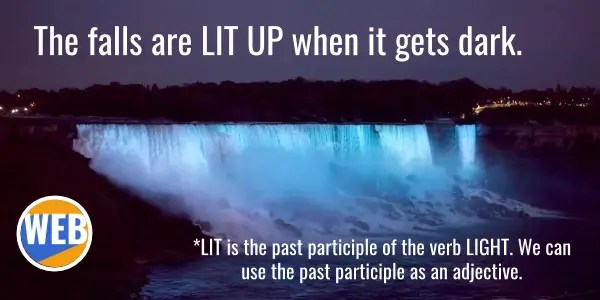
Let’s talk using real English! In this blog post we will answer the following questions:
- What is a tourist attraction?
- What does the phrasal verb “light up” mean?
- How are waterfalls used to generate (make) electricity?
Audio A
If we want to talk using real English we need to have a real story to talk about. We can practice today using my story from the last part of my Canada trip. I went to…
Niagara Falls, Ontario

Niagara Falls is a very popular tourist attraction. A tourist attraction is a place of interest where tourists visit, usually for its natural or cultural value, historical importance, natural or created beauty, offering fun, adventure and excitement.
What we call “Niagara Falls” is actually three waterfalls located at the international border between Canada and the United States. The province of Ontario in Canada, and the state of New York in the U.S.
At night time they light up the falls to make them even more beautiful!
LIGHT UP is a phrasal verb that means to become bright or to make something become bright with light or color.
(Click HERE to for the definition from Oxford Learners Dictionaries.com)

More past participle review @ my PASSIVE VOICE post HERE.
Audio B
The waterfalls are not the tallest in the world but they are very wide. The amount of water that travels over the falls is huge! During the highest water flow times, as much as 2,400 cubic meters (m3) of water are moving over the edge of the falls every second. All this moving water is used to spin turbines to make electricity.
A spinning turbine converts (changes) the energy of flowing water into mechanical energy. A generator converts this mechanical energy into electricity. There are several power plants that send this electricity to houses and businesses in Ontario, Canada, and New York, U.S.A.

I had fun in Niagara Falls, even though I was only there for 1 night.
Now you talk using this new English
Your turn!
What is a tourist attraction in your country?
Have you been there? Did you have fun? What can you do there?
What tourist attractions have you visited in other countries?
Where do you want to visit next?
Write a comment in the REPLY section below and use your new English!
Parts One and Two of my Canada trip Learn Natural English stories.
Canada Trip Pt. 1
Canada Trip Pt. 2
- 31 English Idioms with EYE (Free PDF – Real Examples)Knowing idioms can help you understand the meaning of text and speech more easily. As a Canadian native speaker, I love researching idioms to learn… Read more: 31 English Idioms with EYE (Free PDF – Real Examples)
- Explore the Power of the Prefix Off- A Comprehensive GuideAre you curious about the many ways the prefix off- can be used in English words? If so, you’ve come to the right place. This… Read more: Explore the Power of the Prefix Off- A Comprehensive Guide
- BORROW vs LEND – Your best guide (25 examples, PDF, Video)One of my private English students asked me if there was a trick to help them remember the difference between the verbs lend and borrow.… Read more: BORROW vs LEND – Your best guide (25 examples, PDF, Video)
- What’s the difference between SAY and TELL? (I’ll TELL you the answer)SAY vs. TELL What’s the difference between SAY and TELL? My 4 favorite words to hear from a student are: “I have a question.” If… Read more: What’s the difference between SAY and TELL? (I’ll TELL you the answer)
- Learn English from TV – A complete guide (3 Tips)Learn English from TV shows 3 Tips for Learning English from TV Tip #1 – Choose a small piece of video. Watch and repeat! Tip… Read more: Learn English from TV – A complete guide (3 Tips)





